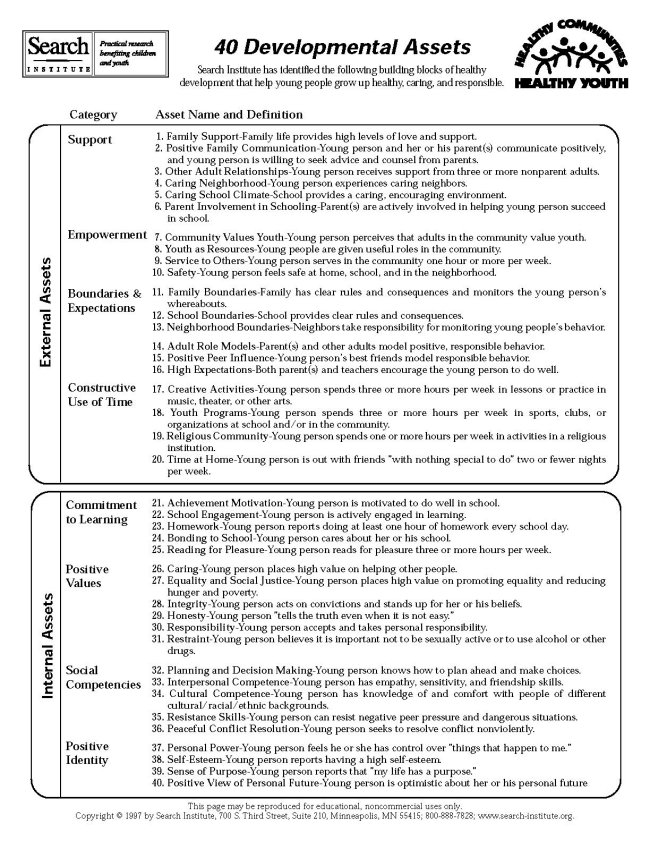Camp Augusta . . . Fun and so much more
What are they?
The 40 assets are pictured and described in the graphic at the bottom of this page. In a nutshell, they are “positive experiences, opportunities, and personal qualities that all children and adolescents from many cultural backgrounds need to be responsible, successful, and caring” (www.search-institute.org).
The list is valuable for several reasons
1. It was not arbitrarily derived based on opinion. Rather, it was abstracted from scientific research conducted over decades about what yields healthy, pro-social children. One could come up with a list hundreds of items long, but these are the ones that made it past the harsh scrutiny of thousands of individuals and rigorous scientific testing.
2. The list is “strength based.” In other words, it is not a list of things to avoid like drugs, sex, and poor grades. When people focus on problems like that, they tend to put a band aide on the real underlying issue – kids need things in their environment and within themselves to avoid those specific problems, other problems, and move toward many positive things.
3. When people focus on problems, it is usually left to counselors, social services, and intervention programs to help children. When people focus on positive elements in children’s lives, EVERYONE becomes part of the solution.
4. The asset model gives everyone a common language to use when discussing what children need, and how they can go about helping to insure that children have as many assets as possible. From the list, healthy communities and healthy children is given focus, and from that focus can arise action. From that action, children can grow up healthy is all aspects of the word.
How many assets do children usually have?
Children with 31 – 40 assets tend to do much better in life socially, emotionally, and academically. They are also far less likely to use drugs or be violent. But, more than 90% of children don’t have that many positive things happening in their lives. In fact, surveys of over a half million children indicate that:
- 20% of children have between 0 & 10 assets
- 42% of children have between 11 & 20 assets
- 30% of children have between 21 & 30 assets
- 8% of children have between 31 & 40 assets
How does Camp Augusta help develop these assets?
Camp Augusta helps parents foster these developmental assets in the following ways. Note that this list only includes ways that Camp Augusta can help, and not the full list, which is pictured below.
External Assets
- Support
- (3) Provide other caring adults
- (5) Provide a caring environment
- Empowerment
- (7) Camp Augusta values youth – we work on their development and potential
- (8) Campers are given useful tasks, such as hoppers, CAP, and our camper counsel
- (9) Service to others, such as our CAP projects and river monitoring
- (10) We create physical and emotional safety through a myriad of systems
- Boundaries and Expectations
- (12) Augusta has clear expectations for appropriate behavior, and they are enforced
- (14) Staff are very carefully selected for their ability to be positive and fun role models
- (15) Counselors and village leaders work very hard to create a positive bunk atmosphere
- (16) Our “Challenge by Choice” program encourages children to be more
- Constructive Use of Time
- (17) Camp Augusta has an enormous amount of opportunities for children to both be creative and experience creativity
- (18) Children spend all day actively engaged, and they often take a newfound skill and hobby home with them
Internal Assets
- Commitment to Learning
- (21) By building general self-confidence, children can see that they can achieve more
Positive Values - (26) Caring is modeled by staff, and fostered through our CAP projects and Evening Embers discussions
- (28) Integrity is modeled by staff, and fostered in children through our “Success Counselor” method
- (29) Honesty is modeled by staff, and fostered in children through our “Success Counselor” method
- (30) Responsibility is modeled by staff, and fostered in children through our “Success Counselor” method
- Social Competencies
- (32) Planning and decision making skills are fostered through the camper choosing clinics, the group process of deciding cabin activities, overnights, meals, and more.
- (33) Interpersonal competence is modeled by staff, and fostered in children through our “Success Counselor” method
- (34) Culture competence is fostered through 30% of the staff coming from other countries, and our International events. We sometimes host special meals in a cultural tradition as well.
- (36) Peaceful conflict resolution is fostered through our “Success Counselor” method
- Positive Identity
- (37) Personal power is fostered through choice over clinic and cabin activities (group process), as well as through our “Success Counselor” method, which teaches children to be powerful
- (40) Positive view of personal future is fostered through general self-confidence increase via such means as being away from home for a long time, achievement in our clinics, and camping out of doors.
Where can I find out more information?
These assets were categorized by the “Search Institute.” You can obtain a large number of books, flyers, research, and other information from their website – www.search-instutute.org

